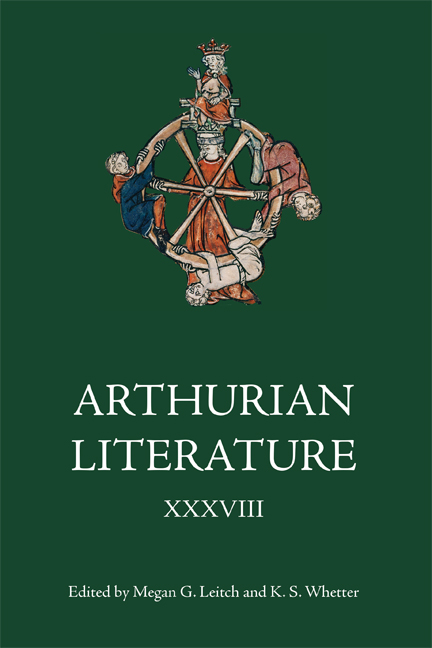Book contents
- Frontmatter
- Contents
- List of Figures and Tables
- Note on the Derek Brewer Prize
- General Editors’ Preface
- List of Contributors
- List of Abbreviations
- 1 The Inaugural Derek Brewer Essay Prize: Animals at the Feast: Strange Strangers and Courtly Power in The Wedding of Sir Gawain and Dame Ragnelle
- 2 The Kindred of a Boy without a Father: Merlin’s British Forebears and Irish Cousins
- 3 Geoffrey of Monmouth’s Subtle Subversion: Active Double- Voiced Discourse in the Historia regum Britanniae
- 4 ‘Cornwall, up in the North’: Geography and Place Names in the Source of the Old Icelandic Brut
- 5 Enacting Arthurianism in the Order of the Garter and Sir Gawain and the Green Knight
- 6 Deviants and Dissenters: Theorizing Shame and Punishment in Malory’s Morte
- 7 Loyalty and Worshyp in Conflict in Malory’s Lancelot
- 8 Emotional Inheritance in Malory’s Morte Darthur: Shame and the Lott–Pellinore Feud
- 9 Navigating and Indexing Arthurian Romance in Benoît Rigaud’s Edition of Lancelot du Lake (1591)
- 10 ‘A great many strange puppets’: Queen Caroline, Merlin’s Cave, and Symbolic Arthurianism in the Age of Reason
- 11 How Galahad Regained his Virginity: Dead Women, Catholicism and the Grail in Nineteenth-Century British Poetry
- Notes
- Miscellaneous Endmatter
General Editors’ Preface
Published online by Cambridge University Press: 10 January 2024
- Frontmatter
- Contents
- List of Figures and Tables
- Note on the Derek Brewer Prize
- General Editors’ Preface
- List of Contributors
- List of Abbreviations
- 1 The Inaugural Derek Brewer Essay Prize: Animals at the Feast: Strange Strangers and Courtly Power in The Wedding of Sir Gawain and Dame Ragnelle
- 2 The Kindred of a Boy without a Father: Merlin’s British Forebears and Irish Cousins
- 3 Geoffrey of Monmouth’s Subtle Subversion: Active Double- Voiced Discourse in the Historia regum Britanniae
- 4 ‘Cornwall, up in the North’: Geography and Place Names in the Source of the Old Icelandic Brut
- 5 Enacting Arthurianism in the Order of the Garter and Sir Gawain and the Green Knight
- 6 Deviants and Dissenters: Theorizing Shame and Punishment in Malory’s Morte
- 7 Loyalty and Worshyp in Conflict in Malory’s Lancelot
- 8 Emotional Inheritance in Malory’s Morte Darthur: Shame and the Lott–Pellinore Feud
- 9 Navigating and Indexing Arthurian Romance in Benoît Rigaud’s Edition of Lancelot du Lake (1591)
- 10 ‘A great many strange puppets’: Queen Caroline, Merlin’s Cave, and Symbolic Arthurianism in the Age of Reason
- 11 How Galahad Regained his Virginity: Dead Women, Catholicism and the Grail in Nineteenth-Century British Poetry
- Notes
- Miscellaneous Endmatter
Summary
This volume of Arthurian Literature offers a range of topics from Celtic to Latin, Middle English to early-modern French, and medieval to nineteenth-century Arthuriana. We are excited to begin with the inaugural Derek Brewer Essay Prize (awarded to a postgraduate student or very early career scholar): see the stimulating eco-critical account of The Weddyng of Syr Gawen and Dame Ragnelle by C. M. Palmer. Palmer argues that Ragnelle typifies the strange stranger, blurring the traditional boundaries or binaries between animal and human; Ragnelle's strangeness both highlights the strangeness of Arthur's court and helps to strengthen that court.
Our first series of studies in this volume focuses on Geoffrey of Monmouth and his possible sources, his rhetoric and his influence and transmission. John Carey offers a thorough survey of Merlin's early origins as a prophet and madman and comparisons of Geoffrey's Merlinus with Lailoken and Merlinus Silvester and Merlinus Ambrosius in Irish and Welsh analogues. Carey is self-avowedly building on some well-established scholarship, but with this paper he establishes the most comprehensive and up-to-date account of the early history of this enduring Arthurian figure. Next, Vanessa K. Iacocca examines Geoffrey's wellknown ambiguity from the perspective of Bakhtinian discourse; Iacocca argues that Geoffrey's subversive discourse undermines the idea of imperial conquest. Having examined analogues to Geoffrey's Merlin and Geoffrey's own playful discourse, we move in Hélène Tétrel's detailed study to an assessment of the treatment of geography and place names in the Old Icelandic Brut; Tétrel uses the Norse-Icelandic handling of names to posit an intermediary source-text between Geoffrey's Latin text and his Norse–Icelandic epigones.
There follows a cluster of papers on Middle English Arthuriana. Matt Clancy reopens the vexed question of the Garter motto at the close of Sir Gawain and the Green Knight, arguing that whoever composed the final lines in Cotton Nero A.x, both Gawayn's belt and Edward III's Garter are part of a larger Arthurian and chivalric materialism. The figure of Gawain recurs in different guises and discussions in the following series of essays on Malory's Morte Darthur, particularly in relation to ideas of shame.
- Type
- Chapter
- Information
- Arthurian Literature XXXVIII , pp. ix - xPublisher: Boydell & BrewerPrint publication year: 2023



